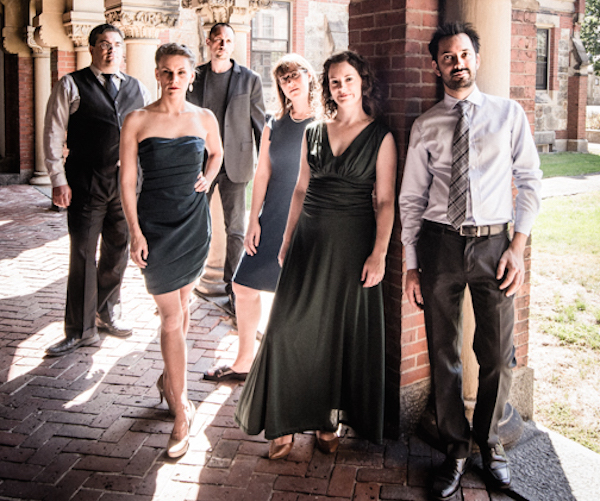Concert Review: Grand Harmonie’s March Madness
This invigorating, sometimes very unpredictable, Beethoven-heavy program certainly offered its share of athleticism and energy.

Grand Harmonie. Photo: Hannah Shields.
By Jonathan Blumhofer
Tis the season for college basketball; why shouldn’t period orchestras get in on the fun, too? So Grand Harmonie’s March Madness seemed to suggest. In the event, this invigorating, sometimes very unpredictable, Beethoven-heavy program certainly offered its share of athleticism and energy. If not quite the same thing as Duke-North Carolina or Kansas-Missouri, Sunday’s finale at Newton’s Second Church delivered its own brand of excitement, proving at the very least that, in music as in sports, expectations are made to be broken.
Much of the credit for this is due conductor Scott Allen Jarrett, who drew playing of terrific momentum and shapely lyricism from the ensemble. His reading of Beethoven’s Symphony no. 1, which closed the concert, danced with the sort of raw edginess that really helps bring this familiar music to life.
That’s not to say anything was sloppy: rather, the sound qualities of period instruments tend to be a bit brasher than those of modern ones. And, in a piece like the First, with its impish episodes and hearty doses of good humor, the physical qualities of the orchestral sound can have the salutary effect of bringing out the music’s personality.
On Sunday, that’s exactly what happened, the sheer presence of the ensemble’s tone helping to emphasize the dashing playfulness of the outer movements and Minuet (the latter, tempo-wise, really ripped), as well as the dance-like quality of the Symphony’s slow second movement.
Jarrett’s work in Boston is primarily as a choral conductor and his reading of the First appropriately gave a strong emphasis to the melodic line. That approach helped ensure a level of textural clarity in the performance that, in turn, fed into the music’s sense of propulsion. His was, in all, a lively, engaging take on the piece that was clearly embraced by the ensemble; the whole performance – which was prefaced by a short, spoken introduction to the music – kicked.
The first half of Sunday’s concert also included some Beethoven, this sung by the excellent young soprano Jacquelyn Stucker. An NEC grad who will be joining the Royal Opera House Covent Garden for a two-year stint this fall, Stucker’s a singer to watch. She’s got a wonderfully lithe instrument, dusky-warm in its low- to mid-register and clear like bell up above. Her tone production throughout is consistent and, while she’s got a good-sized voice, there’s a lightness to her singing that allows her to navigate florid passagework seemingly with ease.
All of those qualities were brought to the fore in her account of Beethoven’s concert aria, “Ah! Perfido,” a performance that married passionate intensity to heartfelt pathos. Interpretively, she mined its depths, singing the opening recitative with fire and lending a touching vulnerability to the reprise of the aria’s middle section (“Per pietà”). And there was more than a hint of defiance in Stucker’s rendition of the music’s torrid closing part.
Jarrett led Grand Harmonie in a buoyant, limber accompaniment that, in phrasing and balance, sensitively matched and supported Stucker’s voice; from a critical and artistic standpoint, then, there really wasn’t much more you could have asked for from these performers in this piece.
Also on the concert’s first half, Grand Harmonie co-founder and valve-less horn player extraordinaire Yoni Kahn made spirited work of Carl Maria von Weber’s bonkers Concertino in E minor.
This is a zany piece. As though the natural horn were not a difficult-enough instrument to play, Weber here put it through its paces with lots of fast, chromatic writing and, at one point around the middle, requiring the soloist to sing and play simultaneously (anticipating George Crumb by about fifteen decades). All of this happens within a style that’s otherwise essentially late Classical, which only adds to the music’s weirdness.
Kahn gamely took it all on. If the performance wasn’t note-perfect, well, blame Weber and the vagaries of the natural horn, an instrument on which it’s almost impossible to play a scale perfectly, let alone a concerto. Kahn’s as good a player as they come and he ably captured the music’s whimsical spirit – which is a high bar, indeed.
Also impressively good-natured was the raucous wind-band arrangement of Mozart’s Overture to The Abduction from the Seraglio that opened the afternoon’s concert. Scored for eleven wind, brass, and percussion players, plus a double bass, it had a pep band-ish quality (mainly owing to the rocketing, antiphonal dialogues passed across the stage between oboes and clarinets). But the piece nicely set the stage for what was to come and served as a fine showcase for Grand Harmonie’s own harmonie (wind) section.
Jonathan Blumhofer is a composer and violist who has been active in the greater Boston area since 2004. His music has received numerous awards and been performed by various ensembles, including the American Composers Orchestra, Kiev Philharmonic, Camerata Chicago, Xanthos Ensemble, and Juventas New Music Group. Since receiving his doctorate from Boston University in 2010, Jon has taught at Clark University, Worcester Polytechnic Institute, and online for the University of Phoenix, in addition to writing music criticism for the Worcester Telegram & Gazette.
Tagged: Emily Dahl Irons, Grand Harmonie, March Madness
